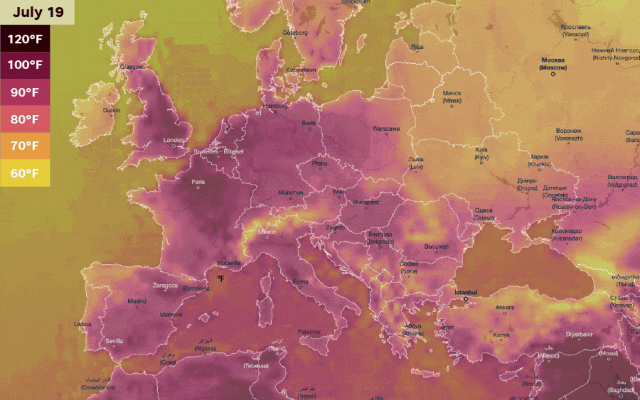Why have electricity prices in Europe been on the rise recently? The main reason is that the demand for electricity in Europe soared in July, and supply and demand affect the market price of electricity.
The Russia-Ukraine war has led to high energy prices in Europe, including electricity and gas prices. With summer approaching, the growth in electricity demand further boosted the demand for gas for power generation. As of July 27, Europe’s natural gas inventory level was 84.78%, +2.61% week-on-week, at an all-time high, inventory replenishment slowed down mainly due to the slow recovery in demand, as well as the early expectations that natural gas prices will continue to decline slowed the pace of replenishment.
According to the research organization, in the past July, the high temperatures for many consecutive days led to a record peak demand for electricity in Spain and Italy on July 19th, and the rest of the European Union also saw an increase in electricity demand during this period.
In France, weekly photovoltaic (PV) generation reached an all-time high, but both PV and wind power generation declined in most of the EU, factors that led to higher electricity market prices in the EU in the third week of July than in the previous week.
European Heat Wave, Red Alerts and Record Temperatures Countries around the Mediterranean are experiencing an intense heat wave in July.
In France, thermometers reached 40.6°C in Verdun and Tiranges, 40.7°C in Luc, and Rome, Italy, broke the heat record with 42.9°C.
In Sardinia, 45.8°C was measured, and even 46.3°C in Licata, Sicily.
In Spain, Catalonia reached the 45°C mark for the first time since measurements began, with 45.3°C in Figueras .
Towards the end of July, the continued rise in summer temperatures combined with the increase in the number of tourists led to an increase in electricity prices in the European power markets.
According to the July European residential electricity price data released by HEPI, the average European residential electricity price in July was 24.86 euro cents/kwh, an increase of 2% from the previous year, and the average electricity price in 27 European countries was 26.34 euro cents/kwh, an increase of 2% from the previous year. Among them, the average residential electricity price in Germany in July was 38.6 euro cents/kwh, a slight decrease of 2% from the previous year, but the overall electricity price in Germany is at a relatively high level. Overall, the average residential electricity price across Europe has recovered, and medium- to long-term household storage demand is likely to rise.
In addition, the shift to coal- and oil-fired power generation in many European countries, influenced by higher natural gas prices, has further pushed up electricity prices. Especially for countries that rely on natural gas imports, their electricity costs have skyrocketed. This situation of rising electricity prices and tight energy supply has not only put a burden on the residents of European countries, but also put enormous pressure on the production and competitiveness of enterprises. Many factories and manufacturers have been forced to cut back on production, and some have even had to stop production, even affecting the shrinkage of jobs in Europe.
Against this background, European governments have taken measures to cope with rising electricity prices. For example, on March 14, 2023, the European Commission proposed a draft reform of the European electricity market in the hope that by optimizing the design of the electricity market and improving products, services and regulatory systems, it will address the concerns of residents, industries and investors about short-term electricity price fluctuations, thereby promoting the development of renewable energies on a larger scale and enhancing the competitiveness of Europe’s overall industry. There are also a number of European countries that have introduced emergency subsidy programs to reduce the burden on residents and enterprises. At the same time, governments are also encouraging energy transition and investment in renewable energy to reduce dependence on traditional energy sources and improve the stability of energy supply.
Nonetheless, it is an indisputable fact that the performance of the European market still sees an increasing share of new energy generation in the European power market. In the face of the rapid development of the photovoltaic market and the challenges posed by the rapid growth of clean energy installations, the European government needs to continue to promote the process of energy transition in order to address the balance between power supply and demand, grid stability, and reasonable electricity prices.
In conclusion, the rising electricity prices in Europe have attracted widespread attention and brought certain challenges to national economies and energy markets. Governments and relevant parties should also strengthen cooperation and take more measures to stabilize electricity prices and promote the sustainable development of energy supply.





